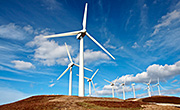
EPA Proposes Rule to Alter Greenhouse Gas Reporting for Oil/Natural Gas Industries
The United States Environmental Protection Agency ("EPA") has proposed changes to the existing greenhouse gas reporting regulations for the natural gas and petroleum system source category to revise certain calculation methods, amend monitoring and data reporting requirements, and amend confidentiality determinations for the new and revised data elements. Comments on the proposed rule are due on April 24.
Under the current rules, all greenhouse gas emissions for this industry sector are reported as carbon dioxide equivalents. Under the proposed rules, emissions would be reported as metric tons of methane, carbon dioxide, and nitrous oxide, as applicable. EPA claims that these revisions will simplify emissions calculations and make the reporting more transparent.
The definition of the source category subject to the reporting requirements would also be revised to add references to engines, boilers, heaters, flares, separation and processing equipment, and maintenance and repair equipment and to remove references to gravity separation equipment and auxiliary non-transportation equipment. EPA claims that these revisions do not substantively change the equipment subject to the reporting rule but instead provide "a more accurate description of the industry segment."
Proposed changes to the reporting requirements include reorganizing the reporting section by source type (such as natural gas pneumatic device venting, acid gas removal vents, and dehydrators) and listing which source types must be reported. EPA claims this will assist in clarifying whether certain data fields were left blank intentionally and reduce the correspondence with regulated entities as EPA reviews and verifies reported data.
Revisions to the procedures for estimating missing data have also been proposed. These revisions include the use of best engineering estimates for any parameter that cannot be reasonably measured or obtained as required by the regulation for up to six months from the first date of applicability. EPA believes that this will assist when regulated entities acquire new wells.
The proposed rule will also remove all references in the subpart to best available monitoring methods ("BAMM") for unique or unusual circumstances. The existing regulations allow entities to use BAMM (rather than data meeting the requirements of the regulations) if EPA approves the usage in advance. Because facilities have had an extended period to come into compliance with the existing regulations, EPA does not believe that the use of BAMM is necessary.
EPA determined that each new or substantially revised data element in the proposed rule was not entitled to treatment as confidential data. In addition, one data element previously classified as confidential (production/throughput data not used as input) would no longer be subject to confidential treatment. This means that all of these data elements would be available to the public.
The proposed rules have been identified as an example of the willingness of the new EPA administrator, Gina McCarthy, to accept input from regulated entities because the proposal contains calculation methods that may more accurately reflect actual greenhouse gas emissions. Others have claimed that the proposal would require more accurate reporting of greenhouse gas emissions from fugitive sources, although EPA claims that the proposed rule would not significantly alter either the entities required to report or the greenhouse gas emissions reported under the existing rules.
Although comments on the proposed rule are due on April 24, EPA is not currently planning to have a public hearing unless one is specifically requested. EPA plans to issue a final rule by the end of 2014 that would become effective January 1, 2015. The first emission reports using the amended regulations would be due on March 31, 2016.
Lawyer Contacts
For further information, please contact your principal Firm representative or one of the lawyers listed below. General email messages may be sent using our "Contact Us" form, which can be found at www.jonesday.com.
Charles T. Wehland
Chicago
+1.312.269.4388
ctwehland@jonesday.com
Mary Beth Deemer
Pittsburgh
+1.412.394.7920
mbdeemer@jonesday.com
Thomas M. Donnelly
San Francisco
+1.415.875.5880
tmdonnelly@jonesday.com
Kevin P. Holewinski
Washington
+1.202.879.3797
kpholewinski@jonesday.com
John A. Rego
Cleveland
+1.216.586.7542
jrego@jonesday.com
Jane K. Murphy
Chicago
+1.312.269.4239
jkmurphy@jonesday.com
Jones Day publications should not be construed as legal advice on any specific facts or circumstances. The contents are intended for general information purposes only and may not be quoted or referred to in any other publication or proceeding without the prior written consent of the Firm, to be given or withheld at our discretion. To request reprint permission for any of our publications, please use our "Contact Us" form, which can be found on our web site at www.jonesday.com. The mailing of this publication is not intended to create, and receipt of it does not constitute, an attorney-client relationship. The views set forth herein are the personal views of the authors and do not necessarily reflect those of the Firm.


